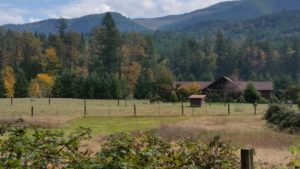
The farm.
And I imagine, because I have been so terrible over the past year about communicating, that more than a few readers of the Strongbow Saga have once again been wondering if maybe I passed, too. Nope—I’m alive! And the good news is that I have made more progress writing book 5 during the first two months of 2020 than I did in all of 2019. I am trying to force myself to have the self-discipline to write every day. That admittedly is something that is not always possible on the farm, but I am now writing more often than not, which keeps the momentum going. I’m not yet able to predict when the book will be finished, but it is at long last coming along steadily.
On the subject of my poor communication, I would like to apologize to all who have tried to contact me by posting or trying to post on this site. I used to have a feature that would send me an email notice whenever someone posted (and if you’ve never posted here before, I have to review and approve it before it will appear). But as I explained in my last post, during 2018 my web hosting service moved all of the websites they host to new, upgraded servers, and that process disabled some features of my website, including the notifications about posts. I am decidedly not tech-savvy, and the friend who was also my website specialist has very little time these days to spare anymore, so I have yet to find a solution to the problem.
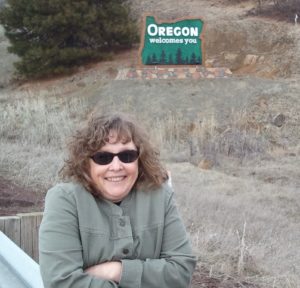
Jeanette at the Oregon border, February 2012.
Eight years ago, on February 26, Jeanette and I reached Oregon. Less than a week later, we found and purchased our small farm located on the edge of the Cascade Mountain range, in the McKenzie River valley. Our life since then has been an amazing adventure: always challenging, often exciting, sometimes overwhelming. But it has been a wonderful experience to share. We met later in life—though we have now been married for sixteen years, this is the second marriage for both of us. We both went through some pretty hard times, separately before we met, and together after we married. To have so many of the things that used to batter us in the past now, and to be able to be together, all day every day, has been a blessing and a joy. We find the solitude especially peaceful: many weeks, we have no interactions with others except for our once-a-week trip to town for grocery shopping and errands.
We certainly did not anticipate, though, when we bought our little homestead farm, how constantly busy our life was going to become. There is no such thing as “free time,” with nothing to do, on our farm. There are just really, really busy times, and somewhat less busy times. Winter, which we are currently coming to the end of, is one of the less busy times, but already we are beginning work on our 2020 garden, by starting seeds to grow the plants which will go into the garden when the weather warms up in the spring.
Fortunately, 2019 was a far healthier year for both of us than 2018. My MS, which flared up badly during 2018, seems to have returned to the mostly dormant state it had been in for over ten years. But I was 60 years old when we moved onto the farm. I’m 68 now, and those eight years have made a difference. This life frequently involves a lot of physical labor, and it is a reality that aging bodies tire quicker, and are more prone to injury. Just since December, for example, I’ve been dealing with two injuries: plantar fasciitis, a form of tendonitis, in my left foot—fortunately I have mostly worked through that by now—and an injury to my right shoulder which I thought was also tendonitis, but which I learned just a few days ago is actually a torn rotator cuff, which may require surgery to repair. But the amazing beauty of this mountain valley where we live, and the challenges of constantly problem solving a variety of issues, many of which we’d never even dreamed might be something we’d someday face (dealing with a herd of sheep, for example), make this life something we love, so much so that now we can no longer imagine going back to a more “normal” existence, which would feel so limited and limiting. For several months this winter, for example, two enormous bald eagles frequently hunted in our area, and the chance to observe such beautiful and magnificent creatures was thrilling.
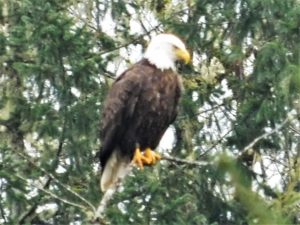
It’s a miracle he never went after our chickens.
Every year, and especially every garden year, brings different challenges. Last summer, in contrast to the two preceding years, the weather was mostly quite pleasant. We had good rainfall in the spring. The garden should have been a heavy producer, and for certain crops, it was—we had asparagus, for instance, from late spring into August. Our potato harvest was also the best we’d ever had, as were our crops of kiwi, pears and apples.
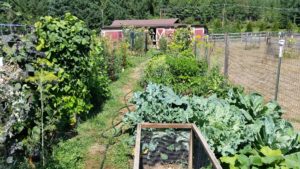
Our 2019 garden at its peak.
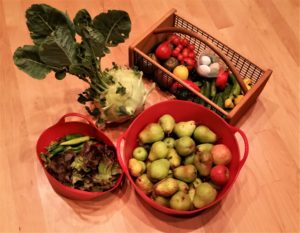
A good day’s harvest.
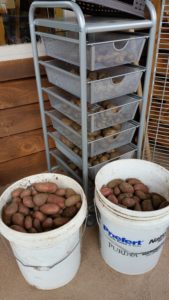
Our best potato crop ever.
But the pleasantness of the weather brought unusually cool nights, which caused many crops to come in very slowly and very late. Some years we’ve had our first tomatoes as early as late May. But in 2019 we got none, not even the early varieties, until late June, no heirlooms until mid-July, and because the autumn rains began in August—something that is almost unheard of in this part of Oregon—our total crop was cut short and was the worst year for tomatoes we’ve ever had. Similarly, our dry beans were so slow to develop we were able to harvest almost none. Nevertheless, we did manage to fill our freezers with a good supply of most types of vegetables and fruit, which we have been enjoying all winter, and the sheep we harvested from our herd of heritage Soay sheep have provided us with a wonderful supply of lean, grass-fed meat.
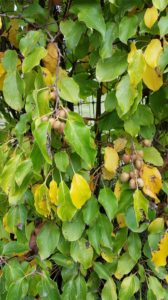
Kiwi on the vine.
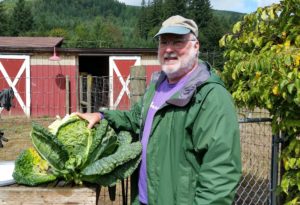
This made over three quarts of delicious sauerkraut.
We—all of us, not just Jeanette and I—are embarked on a very momentous year. The earth’s climate is rushing toward irreversible damage faster than any scientists anticipated, causing ever more frequent extreme, erratic, and destructive weather events. We are, as I write this, in the early stages of what may develop into a dangerous, world-wide pandemic, which could not only cause numerous deaths, but also drive the economies of much of the world, including the United States, into recession. And here, in the United States, we are facing an election which may well determine whether our democracy, as the founding fathers intended it to operate, will survive. We do not seem prepared: our populace is facing these dangerous challenges in a more divided, polarized condition than I have, in my lifetime, ever seen.
We are all in this life together. We must realize that. If we cannot learn to pull together, to try to combat the serious threats we are facing, I do not know what will happen, but I fear things will not end well.
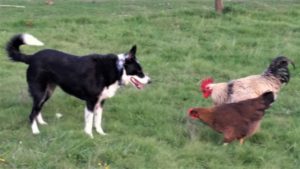
Sigrid, the supervisor of all chickens and sheep on our farm

